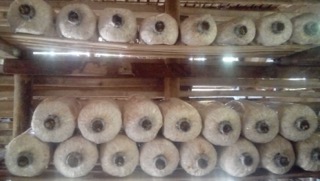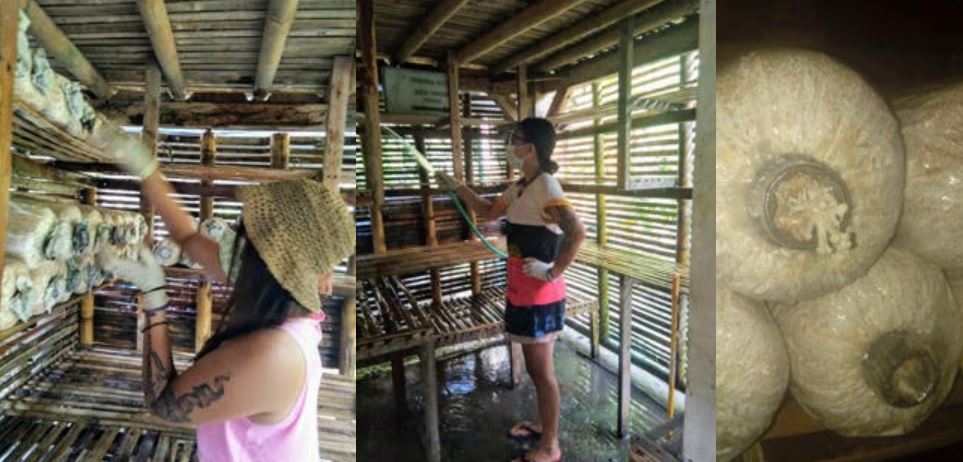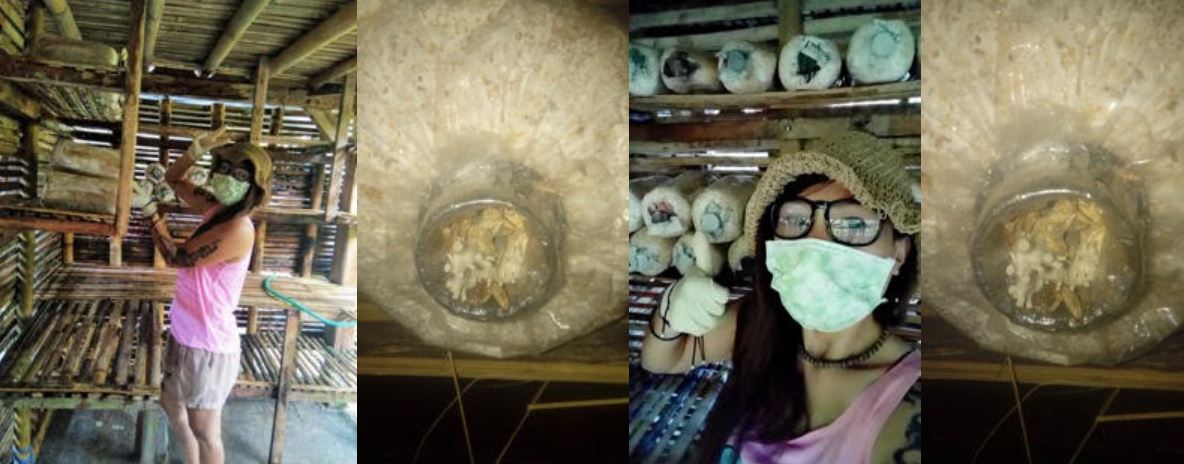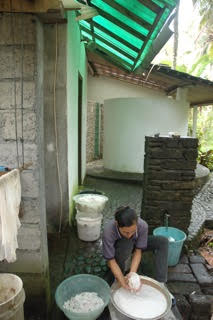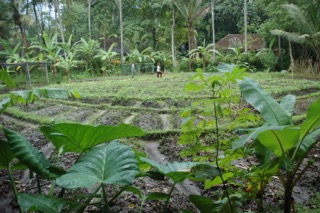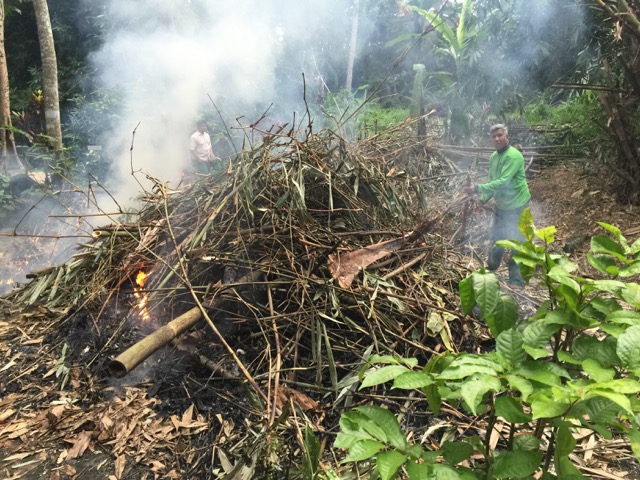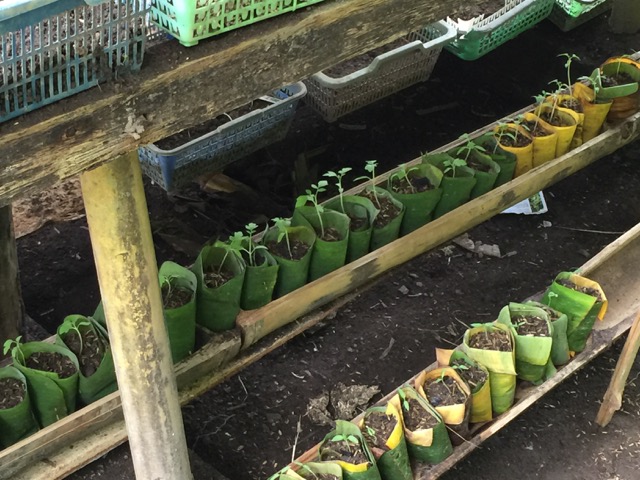Biochar adds many benefits to your garden and helps building up a healthy soil. Millions of microscopic holes provide a living environment for many different microorganisms and help holding back plenty of water. Also Nutrients are effectively locked up and are slowly released according to the requirements of the plants. This way, a loss of nutrients caused by too much rain can be prevented. Biochar can also be used in compost toilets, as a water filter or simply as a burning material.
If you want to use biochar in the garden, it is recommended to saturate the biochar with nutrients before applying to the soil. This can be done by adding biochar during the composting process, mixing with fresh compost or watering it with compost tea. Applying unsaturated biochar directly to the soil could give plants a harder time to grow, because the majority of nutrients may be adsorbed by the char in first place.
The Principles of BioChar Production - Pyrolysis
If you want to make biochar, it is important to understand the physical principles behind the process. If you light up a fire, it is not the wood that burns in first place, but the released gases driven out by heat. The fire will burn these gases in a clear flame consuming all oxygen while forming a protective layer around the wood. As long as there is a lack of oxygen, the wood underneath will carbonize and turn into char. This is called pyrolysis. If no more freshly dried material is added and gases are no longer produced, oxygen can penetrate towards the coal, and the coal will slowly turn to ash. The key point to make biochar is to prevent coal turning into ash while maintaining a clear burn. It’s important to maintain a mostly smoke free fire in order to gain biochar with a good quality and less toxic substances caused by smoke.
To achieve the right process conditions, the physiology of the fire and the geometry of the pit are crucial. Lighting up the fire in a pit or a barrel helps suppressing oxygen flowing from underneath, causing the produced coal to turn to ash. As dry coconut husks are a good material to produce biochar, it can be hard to maintain a clear constant flame by just using husks. Therefore apply easily burnable material just as dry bamboo or wood in the middle of the fire and place the coconut husks around. This creates a chimney effect in the middle that will guarantee a good burning process.
We invite you to read the entire article from our German volunteer Phillip, who, with the help of Ella from Croatia and Evan form Australia demonstrated twice the process of bio charcoaling and enriched our Jiwa Damai soil with this precious fertilizer.
And if you like to visit our garden, or take part in our permaculture workshops, send us an email at contact@jiwadamai.net

![PHOTO-2018-11-14-05-57-58[1].jpg](https://images.squarespace-cdn.com/content/v1/55f25550e4b0fde04e7d1be4/1542622648735-DGXD2G8MJ7QB67ID9Q4U/PHOTO-2018-11-14-05-57-58%5B1%5D.jpg)
![PHOTO-2018-11-14-05-57-58(1)[1].jpg](https://images.squarespace-cdn.com/content/v1/55f25550e4b0fde04e7d1be4/1542622663856-F2X4XCFKBIL4PV5BEV7L/PHOTO-2018-11-14-05-57-58%281%29%5B1%5D.jpg)
![PHOTO-2018-11-14-05-57-59[1].jpg](https://images.squarespace-cdn.com/content/v1/55f25550e4b0fde04e7d1be4/1542622670250-69LRRPLE49AMT76QWP5H/PHOTO-2018-11-14-05-57-59%5B1%5D.jpg)
![PHOTO-2018-11-14-05-58-00[1].jpg](https://images.squarespace-cdn.com/content/v1/55f25550e4b0fde04e7d1be4/1542622676887-CILVHLJNM3Z8VEZ0K9QM/PHOTO-2018-11-14-05-58-00%5B1%5D.jpg)
![PHOTO-2018-11-14-05-58-00(1)[1].jpg](https://images.squarespace-cdn.com/content/v1/55f25550e4b0fde04e7d1be4/1542622707856-I7XW7481XC3N4IVBAJE9/PHOTO-2018-11-14-05-58-00%281%29%5B1%5D.jpg)
![PHOTO-2018-11-14-05-58-01[1].jpg](https://images.squarespace-cdn.com/content/v1/55f25550e4b0fde04e7d1be4/1542622717140-NQX8VCOHCI77AK60JRRG/PHOTO-2018-11-14-05-58-01%5B1%5D.jpg)
![PHOTO-2018-11-14-05-58-01(1)[1].jpg](https://images.squarespace-cdn.com/content/v1/55f25550e4b0fde04e7d1be4/1542622726136-3GSFBAT414UAW98EYUMA/PHOTO-2018-11-14-05-58-01%281%29%5B1%5D.jpg)
![PHOTO-2018-11-14-05-58-01(2)[1].jpg](https://images.squarespace-cdn.com/content/v1/55f25550e4b0fde04e7d1be4/1542622737188-0E5FM8GKVLBY33OPTAN0/PHOTO-2018-11-14-05-58-01%282%29%5B1%5D.jpg)
![PHOTO-2018-11-14-05-58-02(2)[1].jpg](https://images.squarespace-cdn.com/content/v1/55f25550e4b0fde04e7d1be4/1542622767718-OLTREAN7AIJ5SG2U1Y14/PHOTO-2018-11-14-05-58-02%282%29%5B1%5D.jpg)
![PHOTO-2018-11-14-05-58-02(1)[1].jpg](https://images.squarespace-cdn.com/content/v1/55f25550e4b0fde04e7d1be4/1542622773242-QAXNCGLJHCATVWL02GVC/PHOTO-2018-11-14-05-58-02%281%29%5B1%5D.jpg)
![PHOTO-2018-11-14-05-58-02[1].jpg](https://images.squarespace-cdn.com/content/v1/55f25550e4b0fde04e7d1be4/1542622779687-J04CG3M1ME8FY3Y8DYAR/PHOTO-2018-11-14-05-58-02%5B1%5D.jpg)
